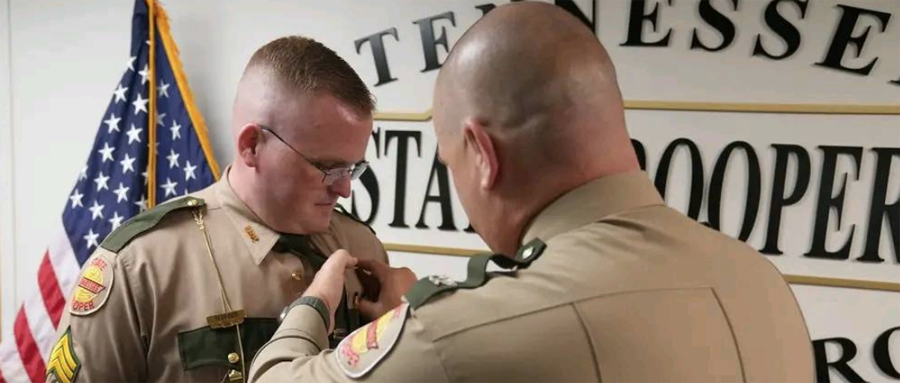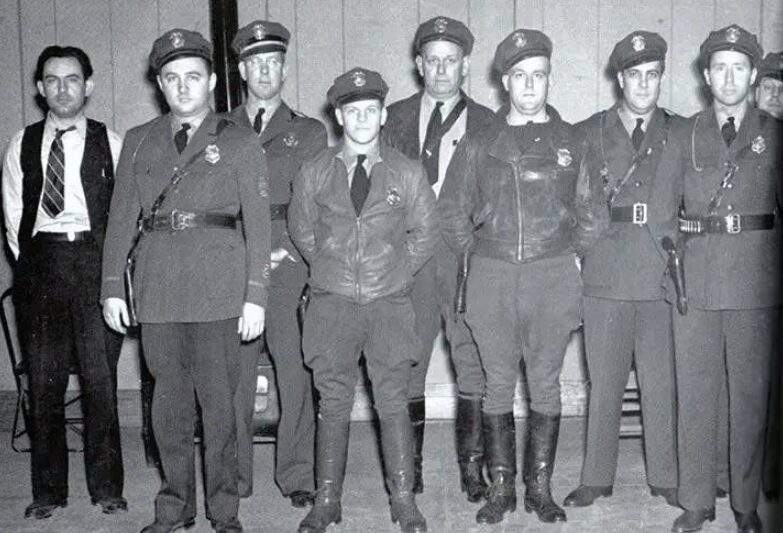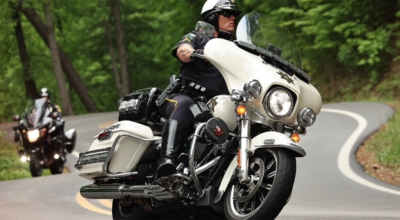
A Tennessee highway patrol trooper gets a recognition from a superior. The department of safety administers motor vehicle laws that are federal. (Photo THP)
My case in U.S. district court in Chattanooga is on appeal to the 6th circuit in Cincinnati. It seeks to decriminalize traffic stops, and makes arguments that I believe are without precedent. It argues that because driving and operating a motor vehicle is a privilege, a state-granted occupational privilege, the holders of the privilege have a right to administrative hearing before criminal adjudication. This claim based on the law itself would effectively force the state to regain the administration of traffic offenses. It has delegated without authority this administration to cities and counties that use criminal authority. Criminal authority is upon riots, affrays, disturbances of the peace, disorder and public offenses. It’s wrong to use criminal authority to arrest me for a damaged taillight and for traveling privately in my automobile not on the license.
This material is from my appeal brief to the court. The county attorney’s office was filed Aug. 6. It defends general warrants and criminalized traffic prosecution in defiance of privilege law in title 55 of the state code, and in defiance of rights of privilege holders to have the issuer of their license get the first shot at correcting or punishing an alleged violation. All it really does is insist my arrest was lawful because county deputy Brandon Bennett had probable cause.
From my first-of-its-kind brief in federal court:

Members of the state highway patrol in 1940 learned early how to harass the traveling public as if they were merchant users of the people’s roads. They enforce the fraudulent financial responsibility program run by revenue and safety, and treat private travelers without regard to their not being in the trucking trades over which by law they have authority. (Photo DOSHS)
***
Supremacy over regulation of interstate commerce cannot be controverted without creating a fundamental error.
Motor vehicle is a federal term since at least 1935. “(13) The term motor vehicle’ means any vehicle, machine, tractor, trailer, or semitrailer propelled or drawn by mechanical power and used upon the highways in the transportation of passengers or property, but does not include any vehicle, locomotive, or car operated exclusively on a rail or rails.” Motor Carrier Act. 1935 (Feb. 4, 1887, c. 104, Part II, § 201, as added Aug. 9, 1935, c. 498, § 1, 49 Stat. 543.) APPENDIX EX. No. 14 FN 13
13 https://tile.loc.gov/storage-services/service/ll/uscode/uscode1934-00204/uscode1934-002049008/uscode1934-002049008.pdf
Congress defines vehicle in terms of transportation privilege “‘VEHICLE’ AS INCLUDING ALL MEANS OF LAND TRANSPORTATION[.] § 4. The word ‘vehicle’ includes every description of carriage or other artificial contrivance used, or capable of being used, as a means of transportation on land.” 61 Stat. 633 Act of July 30, 1947. APPENDIX EX. No. 15 Transportation is “the removal of goods or persons from one place to another, by a carrier.” A carrier is an “individual or organization engaged in transporting passengers or goods for hire.” Black’s Law Dictionary 6th ed.
Motor vehicle regulation is federal, from granting license to every facet of its use, from issuance through suspension to revocation. “[T]he department shall abide by all federal rules and regulations relative to the issuance, suspension, and revocation of driver licenses and qualification of drivers.” T.C.A. § 55-50-50.
State motor vehicle regulation recognizes under the supremacy clause of the U.S. constitution and federal regulation of interstate commerce. (See EXHIBIT No. 2, Doc. 1, PageID # 66, 67). The commissioner of safety claims claims Tennessee is compliant with federal regulation and definitions (Doc. 1, PageID # 9). DOSHS regulates motor vehicles under the secretary of the U.S. department of transportation. T.C.A. § 65-15-101. In regulating the use of “every way publicly maintained that is open to the use of the public for purposes of vehicular travel,” department of safety “shall abide by all federal rules and regulations relative to the issuance, suspension, and revocation of driver licenses and qualification of drivers” T.C.A. § 55-50-504.
“The engaging in any vocation, profession, business or occupation named in this part is declared to be a privilege taxable by the state alone. The privilege tax established in this part shall be collected by the commissioner of revenue and deposited into the state general fund, except as otherwise provided for in this part. “The occupations, businesses and business transactions deemed privileges are to be taxed, and not pursued without license *** ” T.C.A. § 67-4-101.
Vocations subject to tax are as follows; lobbyists; agents; broker-dealers; investment advisers; accountants; architects; brokers; engineers; and landscape architects. audiologists; chiropractors; dentists; optometrists; osteopathic physicians; pharmacists; physicians; podiatrists; psychologists; speech pathologists; veterinarians; attorneys; and athlete agents. T.C.A. § 67-4-1702. Occupations subject to tax.

I am reporter with Eagle Radio Network — marvelously playing rock hits in Chattanooga, and online at https://www.eagleradionetwork.com/
